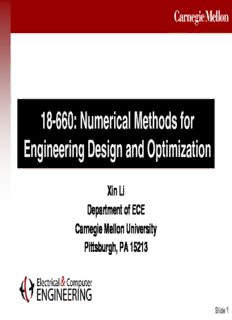
simulated annealing PDF
Preview simulated annealing
18-660: Numerical Methods for Engineering Design and Optimization Xin Li Department of ECE Carnegie Mellon University Pittsburgh, PA 15213 Slide 1 Overview Stochastic Optimization Simulated annealing Slide 2 Local Optimization All optimization algorithms in early lectures assumes “local convexity” for cost function and constraint set Gradient method Newton method Conjugate gradient method Interior point method Global convergence cannot be guaranteed if the actual cost function or constraint set is non-convex Slide 3 Filter Design Example Design a band-stop filter to remove power supply noise Input Output Filter 1 Filter 2 Signal Signal |H(f)| 60±5Hz 120±5Hz Required frequency response f Slide 4 Filter Design Example Design a band-stop filter to remove power supply noise Input Output Filter 1 Filter 2 Signal Signal |H(f)| |H(f)| OR Filter 1 f Filter 1 f |H(f)| |H(f)| Filter 2 f Filter 2 f Slide 5 Filter Design Example Design a band-stop filter to remove power supply noise Input Output Filter 1 Filter 2 Signal Signal z H 2 5 ± Feasible r e 0 t 2 il 1 set f 60±5Hz f Feasible set is not o d n z continuous in this example! a H b 5 p ± o 0 t 6 S 120±5Hz Stop band of filter 1 Slide 6 Stochastic Optimization Stochastic optimization is another useful technique for nonlinear programming Randomized algorithm (not deterministic) Better convergence than local optimization More expensive in computational cost Several important algorithms for stochastic optimization Simulated annealing (focus of this lecture) Genetic programming Slide 7 Simulated Annealing Unconstrained optimization ( ) min f X X Simulated annealing: Start from an initial point Repeatedly consider various new solution points Accept or reject some of these solution candidates Converge to the optimal solution Slide 8 Simulated Annealing Unconstrained optimization ( ) min f X X Simulated annealing was introduced by Metropolis in 1953 It is based on “similarities” and “analogies” with the way that alloys manage to find a nearly global minimum energy level when they are cooled slowly Slide 9 Simulated Annealing Local optimization vs. simulated annealing Local optimization Start from an initial point Repeatedly consider various new solution points Reduce cost function at each iteration Converge to optimal solution Simulated annealing Start from an initial point Repeatedly consider various new solution points Accept/reject new solution using probability at each iteration Converge to optimal solution Slide 10
Description: